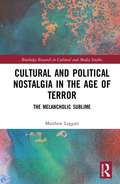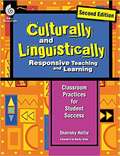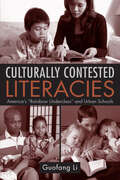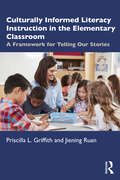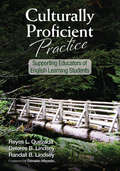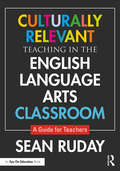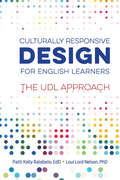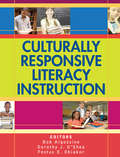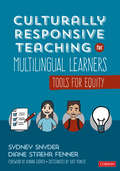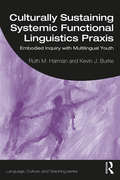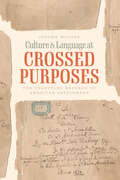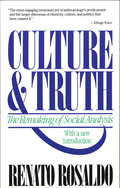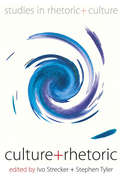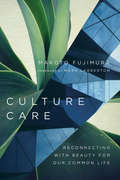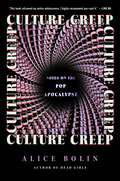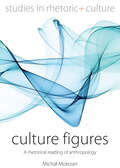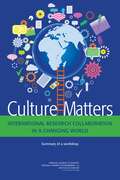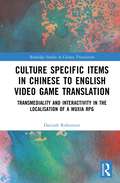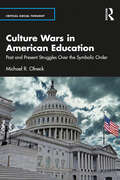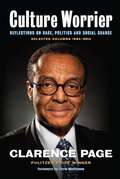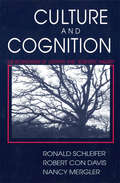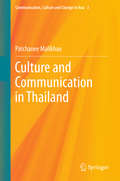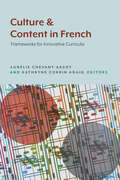- Table View
- List View
Cultural and Political Nostalgia in the Age of Terror: The Melancholic Sublime (Routledge Research in Cultural and Media Studies)
by Matthew LeggattThis book re-examines the role of the sublime across a range of disparate cultural texts, from architecture and art, to literature, digital technology, and film, detailing a worrying trend towards nostalgia and arguing that, although the sublime has the potential to be the most powerful uniting aesthetic force, it currently spreads fear, violence, and retrospection. In exploring contemporary culture, this book touches on the role of architecture to provoke feelings of sublimity, the role of art in the aftermath of destructive events, literature’s establishment of the historical moment as a point of sublime transformation and change, and the place of nostalgia and the returning of past practices in digital culture from gaming to popular cinema.
Culturally And Linguistically: Classroom Practices For Student Success (Culturally And Linguistically Responsive Teaching And Learning)
by Sharroky HollieCulturally and Linguistically Responsive Teaching and Learning is a strategy audio guide designed to help teachers learn key strategies to approach their teaching through a culturally and linguistically responsive lens; embracing and placing value on students' culture and language, allowing them to thrive in the classroom. Narrated by Dr. Sharroky Hollie, this educational resource helps teachers stay up-to-date with current research, best practices, and evidence-based teaching strategies. It provides novice and experienced educators with a pedagogical framework for implementing culturally and linguistically responsive strategies in today's diverse classrooms; addresses culture and language in five key areas: classroom management, academic literacy, academic vocabulary, academic language, and learning environment. PDF resources of the appendices from the print version are included. An ideal resource for teachers either through the school year or during the summer, but also useful for homeschooling parents looking to meet the demands of today’s educational curriculum.
Culturally Contested Literacies: America's "Rainbow Underclass" and Urban Schools
by Guofang LiCulturally Contested Literacies is a vivid ethnographic account of the everyday cross-cultural living and schooling experiences of six culturally-diverse families in urban America. Documenting the ways in which these families learn about literacies and their meanings in relation to schools, inner city environments, and other ethnic groups, Guofang Li's incisive analysis reveals the unique experiences of fractured urban America. Unlike prior research that fragments various social categories, Culturally Contested Literacies explores the rich complexity within each family as they make sense of their daily relations in terms of race, ethnicity, class, and gender. It then juxtaposes the productions of such familial relations across and within cultural groups with the context of the larger socio-political and socio-economic formations. By presenting a realistic picture of the varying ways that America’s "rainbow underclass" might encounter schooling, Li argues that urban education must be understood in relation to not only the individual’s cultural and familial milieu, but also to the interactive context between the individual and schools.
Culturally Informed Literacy Instruction in the Elementary Classroom: A Framework for Telling Our Stories
by Jiening Ruan Priscilla L. GriffithThis text introduces an original, scalable instructional framework called Telling Our Stories (TOS), an approach for supporting culturally informed literacy instruction in the elementary classroom. Connecting the theory to practice, the TOS framework centers the cultural heritage and experiences of students and offers a roadmap to scientifically and pedagogically sound instruction. Aligned with current curriculum standards, chapters feature authentic examples and case studies, reflection questions, and writing activities that will foster a culture of inclusion, community, and academic rigor. The many practical strategies promote students’ learning and appreciation of diversity through academic reading and writing as well as positive school-family and school-community relations. Readers will come away with new ideas, tools, and a thorough understanding of how to integrate culturally informed practices in ways that support the learning of all children. Accessible and comprehensive, this is an essential text for pre-service teachers in courses on ELA methods and literacy instruction, as well as practicing teachers.
Culturally Proficient Practice: Supporting Educators of English Learning Students
by Delores B. Lindsey Randall B. Lindsey Reyes L. QuezadaHelp your English learning students achieve academic success! Designed to empower educators to become agents of change in their classrooms, schools, and communities, this guide introduces the principles of Cultural Proficiency and how they can help improve educators’ ability to effectively teach English language learners. This book features: <p><p> Activities that build core Cultural Proficiency skills and promote personal transformation <p> A chapter-by-chapter rubric for working effectively with English learning students <p> A conversation-starting case story featuring the River View School District <p> Strategies for using action research to improve the success of English learning students
Culturally Relevant Teaching in the English Language Arts Classroom: A Guide for Teachers
by Sean RudayThis book is a practical, research-based, classroom-ready resource for English language arts teachers interested in learning how to incorporate culturally relevant pedagogy into all aspects of their instruction, including writing, reading, and vocabulary lessons. It also provides suggestions for building an inclusive classroom environment in which all students’ backgrounds are valued. Topics covered: Writing strategies and diverse texts Dialect and student writing Applying reading strategies to texts that represent diverse backgrounds Using reading strategies in out-of-school contexts Considering students’ funds of knowledge and language awareness Connecting linguistic diversity to word-root instruction Building an inclusive classroom environment The appendix features several useful tools, including a study guide, a comprehensive list of suggested texts, recommendations for parent communication, and reproducible tools for the classroom. The study guide and reproducibles are available for free download from our website at www.routledge.com/9781138393318.
Culturally Responsive Design for English Learners: The UDL Approach
by Patti Kelly Ralabate Loui Lord NelsonThe cultural and linguistic diversity of students is on the rise, and educators want to know the most effective ways to teach English language learners (ELLs). Two research-based frameworks—Universal Design for Learning (UDL), which addresses the innate brain-based differences of learners, and Culturally Responsive Teaching (CRT), a pedagogy that responds to learners' cultural differences—can help. In this important new book, UDL experts and bestselling authors Patti Kelly Ralabate and Loui Lord Nelson offer a unique lesson planning process that blends UDL and CRT so that educators can proactively meet the learning needs of ELLs. This essential new resource offers scenarios, summaries, reflection questions, and classroom-based exercises to support responsive instruction. Learn to design and craft goals, methods, materials, and assessments that help ELLs optimize their educational experience.
Culturally Responsive Literacy Instruction
by Bob Algozzine Dorothy J O'Shea Dr Festus E. ObiakorImprove reading achievement for students from diverse backgrounds with research-supported practices and culturally responsive interventions in phonemic awareness, phonics/decoding, fluency, vocabulary, and comprehension.
Culturally Responsive Teaching for Multilingual Learners: Tools for Equity
by Diane Staehr Fenner Sydney Cail SnyderWhat will you do to promote multilingual learners’ equity? Our nation’s moment of reckoning with the deficit view of multilingual learners has arrived. The COVID-19 pandemic has further exposed and exacerbated long-standing inequities that stand in the way of MLs’ access to effective instruction. Recent events have also caused us to reflect on our place as educators within the intersection of race and language. In this innovative book, Sydney Snyder and Diane Staehr Fenner share practical, replicable ways you can draw from students’ strengths and promote multilingual learners′ success within and beyond your own classroom walls. In this book you’ll find • Practical and printable, research-based tools that guide you on how to implement culturally responsive teaching in your context • Case studies and reflection exercises to help identify implicit bias in your work and mitigate deficit-based thinking • Authentic classroom video clips in each chapter to show you what culturally responsive teaching actually looks like in practice • Hand-drawn sketch note graphics that spotlight key concepts, reinforce central themes, and engage you with eye-catching and memorable illustrations There is no time like the present for you to reflect on your role in culturally responsive teaching and use new tools to build an even stronger school community that is inclusive of MLs. No matter your role or where you are in your journey, you can confront injustice by taking action steps to develop a climate in which all students’ backgrounds, experiences, and cultures are honored and educators, families, and communities work collaboratively to help MLs thrive. We owe it to our students. On-demand book study-Available now! Authors, Snyder and Staehr Fenner have created an on-demand LMS book study for readers of Culturally Responsive Teaching for Multilingual Learners: Tools for Equity available now from their company SupportEd. The self-paced book study works around your schedule and when you′re done, you’ll earn a certificate for 20 hours of PD. SupportEd can also customize the book study for specific district timelines, cohorts and/or needs upon request.
Culturally Responsive Teaching for Multilingual Learners: Tools for Equity
by Diane Staehr Fenner Sydney Cail SnyderWhat will you do to promote multilingual learners’ equity? Our nation’s moment of reckoning with the deficit view of multilingual learners has arrived. The COVID-19 pandemic has further exposed and exacerbated long-standing inequities that stand in the way of MLs’ access to effective instruction. Recent events have also caused us to reflect on our place as educators within the intersection of race and language. In this innovative book, Sydney Snyder and Diane Staehr Fenner share practical, replicable ways you can draw from students’ strengths and promote multilingual learners′ success within and beyond your own classroom walls. In this book you’ll find • Practical and printable, research-based tools that guide you on how to implement culturally responsive teaching in your context • Case studies and reflection exercises to help identify implicit bias in your work and mitigate deficit-based thinking • Authentic classroom video clips in each chapter to show you what culturally responsive teaching actually looks like in practice • Hand-drawn sketch note graphics that spotlight key concepts, reinforce central themes, and engage you with eye-catching and memorable illustrations There is no time like the present for you to reflect on your role in culturally responsive teaching and use new tools to build an even stronger school community that is inclusive of MLs. No matter your role or where you are in your journey, you can confront injustice by taking action steps to develop a climate in which all students’ backgrounds, experiences, and cultures are honored and educators, families, and communities work collaboratively to help MLs thrive. We owe it to our students. On-demand book study-Available now! Authors, Snyder and Staehr Fenner have created an on-demand LMS book study for readers of Culturally Responsive Teaching for Multilingual Learners: Tools for Equity available now from their company SupportEd. The self-paced book study works around your schedule and when you′re done, you’ll earn a certificate for 20 hours of PD. SupportEd can also customize the book study for specific district timelines, cohorts and/or needs upon request.
Culturally Sustaining Systemic Functional Linguistics Praxis: Embodied Inquiry with Multilingual Youth (Language, Culture, and Teaching Series)
by Kevin J. Burke Ruth M. HarmanBy introducing a framework for culturally sustaining Systemic Functional Linguistics (SFL) praxis, Harman, Burke and other contributing authors guide readers through a practical and analytic exploration of youth participatory work in classroom and community settings. Applying an SFL lens to critical literacy and schooling, this book articulates a vision for youth learning and civic engagement that focuses on the power of performance, spatial learning, community activism and student agency. The book offers a range of research-driven, multimodal resources and methods for teachers to encourage students’ meaning-making. The authors share how teachers and community activists can interact and support diverse and multilingual youth, fostering a dynamic environment that deepens inquiry of the arts and disciplinary area of knowledge. Research in this book provides a model for collaborative engagement and community partnerships, featuring the voices of students and teachers to highlight the importance of agency and action research in supporting literacy learning and transformative inquiry. Demonstrating theoretically and practically how SFL praxis can be applied broadly and deeply in the field, this book is suitable for preservice teachers, teacher educators, graduate students and scholars in bilingual and multilingual education, literacy education and language policy.
Culture & Language at Crossed Purposes: The Unsettled Records of American Settlement
by Jerome McGannCulture and Language at Crossed Purposes unpacks the interpretive problems of colonial treaty-making and uses them to illuminate canonical works from the period. Classic American literature, Jerome McGann argues, is haunted by the betrayal of seventeenth- and eighteenth-century Indian treaties—“a stunned memory preserved in the negative spaces of the treaty records.” A noted scholar of the “textual conditions” of literature, McGann investigates canonical works from the colonial period, including the Arbella sermon and key writings of William Bradford, John Winthrop, Anne Bradstreet, Cotton Mather’s Magnalia, Benjamin Franklin’s celebrated treaty folios and Autobiography, and Thomas Jefferson’s Notes on the State of Virginia. These are highly practical, purpose-driven works—the record of Enlightenment dreams put to the severe test of dangerous conditions. McGann suggests that the treaty-makers never doubted the unsettled character of what they were prosecuting, and a similar conflicted ethos pervades these works. Like the treaty records, they deliberately test themselves against stringent measures of truth and accomplishment and show a distinctive consciousness of their limits and failures. McGann’s book is ultimately a reminder of the public importance of truth and memory—the vocational commitments of humanist scholars and educators.
Culture & Truth
by Renato RosaldoCulture and Truth argues for a new approach to thinking and writing about culture. Exposing the inadequacies of old conceptions of static, monolithic cultures, and of detached, objective observers, Renato Rosaldo argues that new ethnographic writing must come to terms with the dynamic nature of social reality - with history, spontaneity, and human emotions. To move forward, anthropologists and other observers of culture must describe human lives in their rich variety, as ever-changing, mysterious and unpredictable rather than rigid and fixed. In remaking social analysis, their work must therefore acknowledge and celebrate diversity, narrative, emotion, and the unavoidability of subjectivity. Rosaldo's vision of social analysis concentrates on borders - the lines along which different groups work and live with divergent understandings. Drawing upon his own background as a Chicano as well as upon the works of three Chicano writers, Rosaldo claims that cultures by their very nature are heterogenous and always working in the realm of borders.
Culture And Rhetoric
by Ivo Strecker Stephen TylerWhile some scholars have said that there is no such thing as culture and have urged to abandon the concept altogether, the contributors to this volume overcome this impasse by understanding cultures and their representations for what they ultimately are - rhetorical constructs. These senior, international scholars explore the complex relationships between culture and rhetoric arguing that just as rhetoric is founded in culture, culture is founded in rhetoric. This intersection constitutes the central theme of the first part of the book, while the second is dedicated to the study of figuration as a common ground of rhetoric and anthropology. The book offers a compelling range of theoretical reflections, historical vistas, and empirical investigations, which aim to show how people talk themselves and others into particular modalities of thought and action, and how rhetoric and culture, in this way, are co-emergent. It thus turns a new page in the history of academic discourse by bringing two disciplines - anthropology and rhetoric - together in a way that has never been done before.
Culture Care: Reconnecting with Beauty for Our Common Life
by Makoto Fujimura15th Annual Outreach Magazine Resource of the Year - Culture Christianity Today's 2018 Book of the Year Award of Merit - Culture and the Arts "Culture is not a territory to be won or lost but a resource we are called to steward with care. Culture is a garden to be cultivated." Many bemoan the decay of culture. But we all have a responsibility to care for culture, to nurture it in ways that help people thrive. In Culture Care artist Makoto Fujimura issues a call to cultural stewardship, in which we become generative and feed our culture's soul with beauty, creativity, and generosity. We serve others as cultural custodians of the future. This is a book for artists, but artists come in many forms. Anyone with a calling to create—from visual artists, musicians, writers, and actors to entrepreneurs, pastors, and business professionals—will resonate with its message. This book is for anyone with a desire or an artistic gift to reach across boundaries with understanding, reconciliation, and healing. It is a book for anyone with a passion for the arts, for supporters of the arts, and for "creative catalysts" who understand how much the culture we all share affects human thriving today and shapes the generations to come. Culture Care includes a study guide for individual reflection or group discussion.
Culture Creep: Notes on the Pop Apocalypse
by Alice Bolin"This book re-framed my entire adolescence. I highly recommend you read it." — LING MAFrom the critically acclaimed author of Dead Girls (“stylish and inspired”—New York Times Book Review), a sharp, engrossing collection of essays that explore the strange career of popular feminism and steady creep of cults and cult-think into our daily lives.In seven stunning original essays, Alice Bolin turns her gaze to the myriad ways femininity is remixed and reconstructed by the pop culture of the computer age. The unlikely, often insidious forces that drive our popular obsessions are brilliantly cataloged, contextualized, and questioned in a kaleidoscopic style imitating the internet itself.In “The Enumerated Woman,” Bolin investigates how digital diet tracking apps have increasingly transformed our relationships to our bodies. Animal Crossing’s soothing retail therapy is analyzed in “Real Time”—a surprisingly powerful portrait of late capitalism. And in the showstopping “Foundering,” Bolin dissects our buy-in and complicity with mythmaking around iconic founders, from the hubristic fall of Silicon Valley titans, to Enron, Hamilton, and the USA.For readers of Trick Mirror and How to Do Nothing, Culture Creep is a swirl of nostalgia and visions of the future, questioning why, in the face of seismic cultural, political, and technological shifts as disruptive as the internet, we cling to the icons and ideals of the past. Written with her signature blend of the personal and sharply analytical, each of these keen-eyed essays ask us to reckon with our own participation in all manner of popular cults of being, and cults of believing.
Culture Figures: A Rhetorical Reading of Anthropology (Studies in Rhetoric and Culture #10)
by Michał MokrzanEthnographic research, anthropological theory, and the understanding of the objects of inquiry, are co-created through figuration (using tropes and rhetorical figures) and techniques of persuasion. Delving into descriptive ethnography and theoretical texts spanning across classical monographs and recent texts in cultural anthropology, Culture Figures places rhetoric and rhetoricity as central to the discipline’s self-understanding. It focuses on how understandings of ‘culture’ and social life are shaped and conveyed in cultural anthropology through textual rhetoric. The book demonstrates how processes of using tropes and modes of persuasion underlie the creation of meanings or misunderstandings in society.
Culture Matters: International Research Collaboration in a Changing World--Summary of a Workshop
by Susan Sauer SloanIn an increasingly interconnected world, science and technology research often transects international boundaries and involves researchers from multiple nations. This paradigm provides both new opportunities and new challenges. As science and technology capabilities grow around the world, United States-based organizations are finding that international collaborations and partnerships provide unique opportunities to enhance research and training. At the same time, enhancing international collaboration requires recognition of differences in culture, legitimate national security needs, and critical needs in education and training. Culture Matters is the summary of a workshop convened by the Government-University-Industry Research Roundtable (GUIRR) in July 2013 to address how culture and cultural perception influence and impact the process by which research agreements are made and negotiated across international boundaries. In this workshop, "Culture Matters: An Approach to International Research Agreements", representatives from around the world and from GUIRR's three constituent sectors - government, university, and industry - gathered to provide input into four specific meeting tracks or domains. The tracks focused on research and agreements affecting or involving people/human subjects; environmental and natural resources; science, engineering, and manufacturing; and agriculture and animal issues. This report examines each of these domains and the role that culture and cultural expectations may have in the forging and implementation of international research agreements.
Culture Specific Items in Chinese to English Video Game Translation: Transmediality and Interactivity in the Localisation of a Wuxia RPG (Routledge Studies in Chinese Translation)
by Dariush RobertsonCulture Specific Items in Chinese to English Video Game Translation aims to investigate the Chinese to English translation of culture-specific items (CSIs) in the localisation of a wuxia role-playing game (RPG). This monograph provides groundbreaking insight into authentic practice and analyses a case study with theories from both translation studies and sociology to address questions such as how linguists translate CSIs, why they use certain approaches, and what is revealed when both the translation behaviour and the reasons underpinning their practice are considered in context. This book will be primarily of interest to scholars in the fields of translation studies, localisation, video game translation, and Chinese to English translation. It will also be of interest to a wider range of scholars interested in China, video games, and the application of social theory.
Culture Wars in American Education: Past and Present Struggles Over the Symbolic Order (Critical Social Thought)
by Michael R. OlneckCulture Wars in American Education: Past and Present Struggles Over the Symbolic Order radically questions norms and values held within US Education and analyses why and how culture wars in American education are intense, consequential, and recurrent.Applying the concept of “symbolic order,” this volume elaborates ways in which symbolic representations are used to draw boundaries, allocate status, and legitimate the exercise of authority and power within American schooling. In particular, the book illustrates the “terms of inclusion” by which full membership in the national community is defined, limited, and contested. It suggests that repetitive patterns in the symbolic order, for example, the persistence of the representation of an individualistic basis of American society and polity, constrain the reach of progressive change. The book examines the World War I era Americanization movement, the World War II era Intercultural Education movement, the late-twentieth-century Multicultural Education movement, continuing right-wing assaults on Ethnic Studies and Critical Race Theory in the first decades of the twenty-first century, and historical and contemporary conflicts over the incorporation of languages other than Standard English into approved instructional approaches.In the context of continuing culture wars in the United States and across the globe, this book will be of interest to graduate students and scholars in critical studies of education, history of education, sociology of education, curriculum theory, Multicultural Education, and comparative education, as well as to educators enmeshed in contemporary tensions and conflicts.
Culture Worrier: Selected Columns 19842014
by Chris Matthews Clarence PagePulitzer Prize winner Clarence Page is one of the most nationally recognized and highly regarded syndicated columnists in the country, and his newest book, Culture Worrier: Selected Columns 1984-2014, commemorates the 30th anniversary of his column's first appearance in the Chicago Tribune. It is the first such collection of his columns, and a long overdue archive of his best work, covering topics such as politics, social issues, pop culture, race, family, new media, prominent figures, as well as his own personal life.Page has been a broadcast mainstay for decades, delivering his sensible and balanced perspective on The MacLaughlin Group, NewsHour with Jim Lehrer, NPR's Weekend Edition, MSNBC's Chris Matthews Show, and many other popular shows. His column, which is featured in over 150 newspapers, provides keen and clever insight on the day's most pressing political and social issues. While Page is known for his liberal-leaning views, readers have always appreciated his unbiased approach in directing criticism across the political spectrum, to any individual person or general issue deserving of examination.Culture Worrier: Selected Columns 1984-2014 is sure to be one of the most entertaining and fascinating column collections in recent years, bringing Page's unique perspective within the African-American and political communities, and wealth of fascinating experiential knowledge, to the foreground of our ongoing national dialogue. As a veteran media member who has lived through the transition from print's heyday to modern mobile publishing, from the Vietnam War through the wars in Afghanistan and Iraq, and from the Civil Rights movement to the election of Barack Obama, Page is one of the most revered and uniquely qualified commentators of our time. This book will certainly be a bookshelf staple for the informed who favor balanced criticism of major current affairs and political events.
Culture and Cognition: The Boundaries of Literary and Scientific Inquiry
by Robert Con Davis Ronald Schleifer Nancy MerglerThis groundbreaking book challenges the disciplinary boundaries that have traditionally separated scientific inquiry from literary inquiry. It explores scientific knowledge in three subject areas—the natural history of aging, literary narrative, and psychoanalysis. In the authors' view, the different perspectives on cognition afforded by Anglo-American cognitive science, Greimassian semiotics, and Lacanian psychoanalysis help us to redefine our very notion of culture.Part I historically situates the concepts of meaning and truth in twentieth-century semiotic theory and cognitive science. Part II contrasts the modes of Freudian case history to the general instance of Einstein's relativity theory and then sets forth a rhetoric of narrative based on the discourse of the aged. Part III examines in the context of literary studies an interdisciplinary concept of cultural cognition.Culture and Cognition will be essential reading for literary theorists, historians and philosophers of science; semioticians; and scholars and students of cultural studies, the sociology of literature, and science and literature.
Culture and Commerce in Conrad's Asian Fiction
by Andrew FrancisAndrew Francis' Culture and Commerce in Conrad's Asian Fiction is the first book-length critical study of commerce in Conrad's work. It reveals not only the complex connections between culture and commerce in Conrad's Asian fiction, but also how he employed commerce in characterization, moral contexts, and his depiction of relations at a point of advanced European imperialism. Conrad's treatment of commerce - Arab, Chinese and Malay, as well as European - is explored within a historically specific context as intricate and resistant to traditional readings of commerce as simple and homogeneous. Through the analysis of both literary and non-literary sources, this book examines capitalism, colonialism and globalization within the commercial, political and social contexts of colonial Southeast Asia.
Culture and Communication in Thailand (Communication, Culture and Change in Asia #3)
by Patchanee MalikhaoThis book features research papers that examine a host of contemporary issues in Thailand. Coverage includes culture, gender violence, tourism, human trafficking, environmental and ecological issues, sustainability and the sufficiency economy, the (mis)handling of elephants, and more. It features a sociological and anthropological perspective with a dash of communication for sustainable social change. The papers investigate the various phases of communication technology and its impact on cultural change in the country. They explore the use of social networks and privacy issues as well as ethical journalism in the contexts of Thai Buddhism, Thai culture, and other enabling environmental factors. The contributors focus on documentary research of both quantitative and qualitative data on Thai social change as a consequence of globalization and digital technology. They first provide a general overview of social media and communication in the country. Next, the authors go on to explore the specifics of digital communication. This includes a look at its impact on the various ways of Thai communication given politico-economic and religious influences.
Culture and Content in French: Frameworks for Innovative Curricula
by Aurélie Chevant-AksoyInstructors in today’s language classrooms face the challenge of preparing globally competent and socially responsible students with transcultural aptitude. As classroom content shifts toward communication, collaboration, and problem solving across cultural, racial, and linguistic boundaries, the teaching of culture is an integral part of foreign language education. This volume offers nontraditional approaches to teaching culture in a complex time when the internet and social networks have blurred geographical, social, and political borders.The authors offer practical advice about teaching culture with kinesthetics, music, improvisation, and communication technologies for different competency levels.The chapters also explore multi-literacies, project-based learning, and discussions on teaching culture through literature, media, and film.The appendices share examples of course syllabi, specific course activities, and extracurricular projects that explore culinary practices, performing arts, pop culture, geolocation, digital literacy, journalism, and civic literacy.
